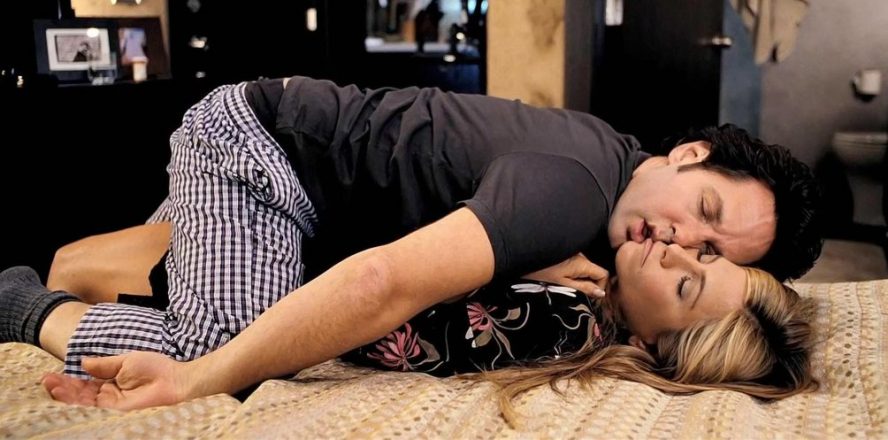| Worth seeing: | as a two-in-one fish-out-of-water comedy that fails to live up to its potential |

| Director: | David Wain |
| Featuring: | Jennifer Aniston, Paul Rudd, Alan Alda, Justin Theroux, Kathryn Hahn, Ken Marino, Lauren Ambrose, Malin Akerman |
| Length: | 98 minutes |
| Certificate: | 15 |
| Country: | US |
| Released: | 2nd March 2012 |
WHAT’S IT ABOUT?
Thirty-something New York couple George (Paul Rudd) and Linda (Jennifer Aniston) lose the flat they’ve just bought when he’s laid off, so they have no choice but to leave the big city and stay with – and work for – his loathsome, but wealthy brother Rick (Ken Marino).
It’s a long drive and Linda needs to get out of the car, so they stop for the night at the next bed-and-breakfast they come across.
Being kept awake by music downstairs, George goes to investigate and finds that the B&B is actually part of a hippy commune – and within minutes, he’s brought under their spell, smoking weed, dancing and playing the didgeridoo.
When Linda pops downstairs to find out why the noise is continuing and George hasn’t come back, she joins in, but without George’s enthusiasm.
He feels that he could stay for a while, but she needs her home comforts, so they leave and head to Rick’s, but things don’t work out as planned, so the couple return to take up the invitation to join the commune.
As the days go by, a dubious Linda grows increasingly comfortable, while the free-spirited George tightens up and becomes frustrated by what he comes to regard as the naive wholesomeness of the free-love, vegetarian kooks.
When hunky (in Linda’s view) and creepy (according to George) resident Seth (Justin Theroux) starts showing an interest in Linda, George can take no more and gives her an ultimatum; he doesn’t like her response, but honours it.
With their relationship pushed to the limit not by the lack of money, but the surplus of love, can George and Linda rescue the marriage – either inside or outside the commune?
WHAT’S IT LIKE?
The film gets off to a strong start, setting up a likeable and funny couple, and when they initially arrive at the commune, it provides much scope for successfully mined comedy.
But when they return to try it for real, a believable plot gives way to a comic fantasy world, which isn’t consistently funny enough to engage.
Necessarily, the supporting characters – both inside and outside the commune – are idiosyncratic grotesques – from the smarmy Seth to the chauvinistic Rick – making most of the jokes predictable and many wear thin very quickly.
The journey of George and Linda is at once inevitable and unconvincing – at first he loves the commune and she hates it, but later she’s drawn in while he’s driven away – it’s clear where the story is going, but it still doesn’t feel right as it meanders along its formulaic path. This is partly because the initially likeable and funny couple lose sympathy, the further they go from the normality that the audience can identify with. It’s not entirely clear whether it’s a failing in the writing or whether the performances can’t keep up.
There’s no question that the film has its fun moments, but it has nothing like the philosophical depth it might claim to explore as a middle-class capitalist couple try a lifestyle about as far from their comfort zone as they can get.
Fish-out-of-water comedies are two-a-penny, but using a couple rather than an individual opens the possibilities for humour, as they handle the situation differently, but its handling here is clunky and obvious and doesn’t paint a particularly attractive picture of either lifestyle – with most characters, almost without acceptance, swinging wildly and incoherently between acceptance and intolerance.
